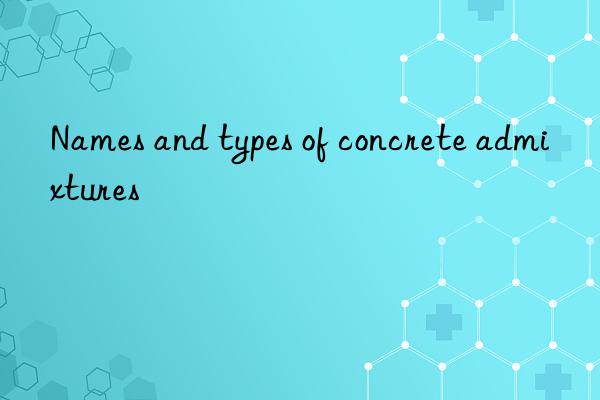
The International Organization for Standardization SIOTC71/SC3 has discussed international standards for concrete admixtures since 1980. After the second meeting in Oslo, Norway and Geneva, Switzerland, the definition of concrete admixtures was proposed as follows: "When mixing concrete, mortar, and paste, or in additional mixing operations, equal to or less than 5% of the weight of cement is added, so that A product in which the normal properties of concrete can be modified as required."
In accordance with the principles of the definition of concrete admixtures proposed by the International Organization for Standardization, our country has formulated and promulgated the national standard GBSO75, which is defined as follows: "Concrete admixtures are Substances added during the mixing process of concrete to improve the properties of concrete. The dosage shall not exceed 5% of the weight of cement (except in special circumstances)."
According to the above definition, concrete admixtures are different from cement mixing materials. Generally, the dosage of mixed materials is relatively large (much more than 5%), and most of them are added during the cement production process. A small amount of substances added to meet the special requirements of cement properties, such as setting agent gypsum and co-solvent, are generally not classified as concrete admixtures.
my country's standards define different types of concrete admixtures as follows:
(1 ) Ordinary water-reducing admixture is an admixture that can reduce the amount of mixing water when the slump of concrete is basically the same. This type of water reducing agent mainly includes: lignosulfonates, hydroxycarboxylic acid salts, and polyols. Polyoxyethylene alkyl ethers, humic acid water reducing agents, etc.
(2) Super plasticizer is an admixture that can significantly reduce the amount of mixing water when the slump of concrete is basically the same. The main varieties of high-efficiency water-reducing agents include: caisulfonic acid formaldehyde condensate, sulfonated melamine water-soluble resin; polycyclic aromatic light sulfonate condensate; sulfonated coal tar series; sulfamate series; maleic acid copolymer series ;Polyacrylate graft copolymer, etc.
(3) Air entraining admixture is an admixture that can introduce a large number of evenly distributed, stable and closed micro-bubbles during the concrete mixing process. Air entraining and water reducing admixture is an admixture with both air entraining and water reducing functions. The main types are: rosin resins, such as rosin soap, rosin thermopolymer; alkyl benzene sulfonates, such as alkyl benzene phosphates, alkyl phenol polyoxyethylene ethers; fatty alcohol sulfonates, such as fatty alcohols Polyoxyethylene ether, fatty alcohol sodium polyoxyethylene sulfonate.
(4) Retarder (Set retarder) is an admixture that prolongs the setting time of concrete. Set retarder and water reducing admixture is an admixture with both retarder and water reducing functions. This type of water-reducing agent mainly includes: sugars, such as sugar calcium, molasses, sucrose, grape sugar; hydrocarbon acids, such as citrus acid, tartaric acid, salicylic acid; polyols, such as cellulose, cellulose ether , Polyvinyl alcohol: inorganic salts, such as tripolyphosphate, zinc salt, borate; lignosulfonates, such as lignocalcium, lignin sodium, lignin magnesium, etc., but they are often classified as ordinary water reducing agents. .
(5) Hardening accelertor is an admixture that accelerates the early strength development of concrete. Hardening accelerator and water reducing admixture is an admixture with both early strength and water reducing functions. This type of water reducing agent mainly includes: chlorides, such as calcium chloride, sodium chloride, potassium chloride; sulfates, such as sodium sulfate, calcium sulfate, sodium thiosulfate; nitrates, such as sodium nitrate, sodium sulfate, etc. Sodium nitrate, calcium nitrate, calcium nitrite; organic substances, such as triethanolamine, triisopropanolamine.
(6) Anti-freezing admixture is an admixture that can harden concrete at negative temperatures and achieve sufficient anti-freeze strength within a specified time. Antifreeze is a compound admixture. The main antifreeze ingredients include the following types: chlorine salts. Such as calcium chloride, sodium chloride; nitrates: such as sodium nitrate, sodium nitrite, calcium nitrate, calcium nitrite: carbonates: such as calcium carbonate, potassium carbonate; ammonia, such as ammonium hydroxide; organic: Such as urea and organic sulfides.
(7) Flash setting admixture is an admixture that can quickly solidify and harden concrete. Accelerating setting agents can be roughly divided into three categories: alumina clinker and carbonate series, with aluminates and carbonates as the main components; alumina clinker and alunite series, with alumina clinker and sulfates as the main components ; Water glass system, mainly composed of water glass and other inorganic salts.
(8) Pumping aid is an admixture that can improve the pumping performance of concrete mixtures. Pumping agent is a composite admixture whose main components are water reducing agent, air entraining agent, retardant, etc.
(9) Other special requirements admixture
a. Water repellent admixture ) Admixtures that can reduce the water permeability of concrete under hydrostatic pressure.
b. Anticorrosion admixture is an admixture that can inhibit or reduce the corrosion of steel bars or other embedded metals in concrete.
c. Apply the release agent on the surface of the concrete formwork to create a gap between the concrete and the formwork.It has the function of facilitating demoulding and protecting the cleanliness between concrete and formwork surface.
d. The curing agent is applied to the concrete surface to form an impermeable film to prevent the concrete surface from losing water and affecting its hydration during open-air curing. Development of structures and concrete strength. </p


